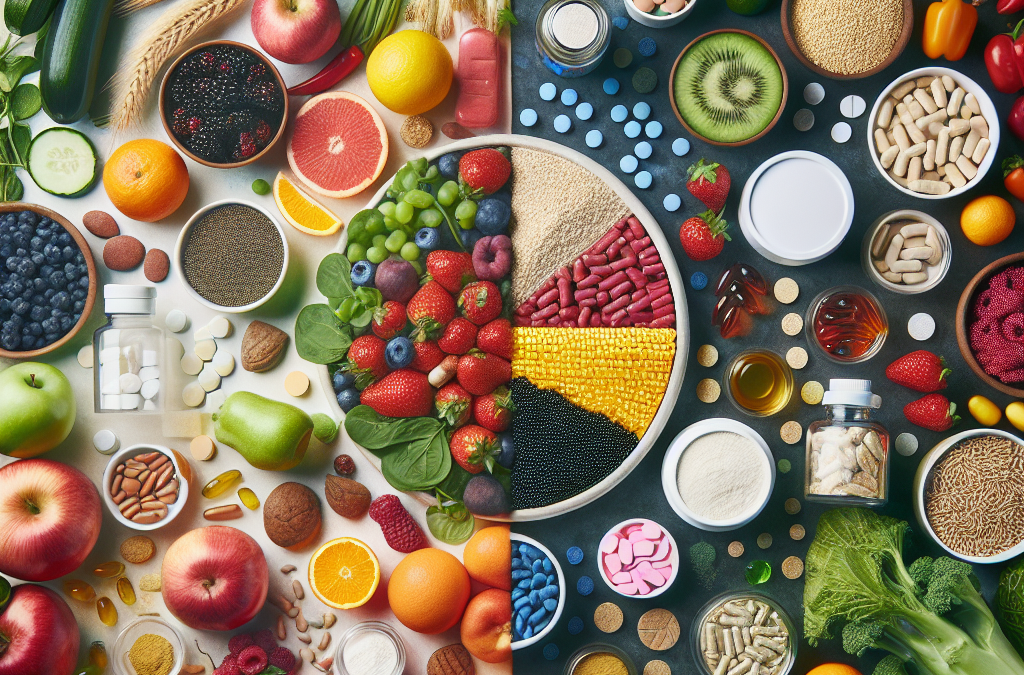Understanding Whole Foods
What are Whole Foods?
Whole foods are pretty much everything that comes from nature. Think of fruits, veggies, whole grains, nuts, and seeds. These foods haven’t been tampered with too much, which means they still have all the vitamins and minerals in their natural forms. Honestly, I love grabbing a shiny apple or crunchy carrot straight from the market. Just feeling the freshness energizes me!
In my experience, when you eat whole foods, you’re getting a package deal of fiber, antioxidants, and other goodies that supplements just can’t match. Plus, there’s something about biting into a peach that makes you feel alive, right? The taste alone is worth it!
Moreover, whole foods are usually more satisfying in terms of taste and texture. There’s a certain joy in preparing a meal with fresh, whole ingredients rather than pouring a scoop of powder. It’s like a celebration for your taste buds, and trust me, your body thanks you in more ways than one.
Benefits of Whole Foods
High Nutritional Value
When I think about my health journey, the nutritional value of whole foods tops the list. Whole foods are packed with essential nutrients that our bodies crave. Each piece of broccoli or handful of nuts brings a host of vitamins that work together beautifully—far more than isolated vitamins in a supplement.
For example, a sweet potato isn’t just about beta-carotene; it’s loaded with dietary fiber, potassium, and vitamin C, all working synergistically to keep you thriving. I often tell my friends that eating a rainbow of whole foods is like a personal health investment you’re making. Every color brings different perks!
Plus, whole foods tend to be lower in calories and higher in satiety, which helps when you’re trying to keep your weight in check. It’s easier to feel full and satisfied with a hearty vegetable stir-fry than a handful of gummy vitamins. You’re nourishing your body while also savoring every bite!
The Role of Supplements
What are Supplements?
Supplements are those capsules, tablets, and powders you often see at health stores or online. They’re designed to fill in any nutritional gaps your diet might have. Though they can be super convenient, I’ve always found that they shouldn’t replace the good stuff found in whole foods.
I’ve met folks who swear by their vitamin stacks, but honestly, if I can get those nutrients from my plate first, that’s my go-to. Supplements can be useful, especially for those of us with special dietary restrictions. For example, I know vegans who lean heavily on B12 supplements to hit their nutrient marks.
That said, always remember: supplements are just that—supplements. They aren’t miracle workers! And they certainly won’t counteract a diet of junk food. It’s crucial to be mindful of balance in our diets. They are your safety net, not your main course.
When to Consider Supplements
Specific Nutritional Needs
Let’s be real—sometimes life gets in the way! Whether you’re busy juggling work, family, and everything in between, there might be days when you don’t eat as well as you should. During those times, I lean on supplements to help with my overall nutrition, especially in winter when salads don’t sound appealing.
Get an Amazing Discount on the Best Certified Organic Whole Food Supplement!
Some folks have specific dietary restrictions or lifestyles that require a bit of extra help. For example, pregnant women, seniors, or athletes might need more of certain vitamins and minerals to keep their systems running smoothly. In these cases, it’s totally okay to grab a supplement to help meet those needs.
However, my rule of thumb is always to consult with a healthcare provider before starting any supplement regimen. It’s crucial to know exactly what your body is lacking and find the right solutions for you. It’s part of caring for yourself, and we all deserve that!
How to Strike a Balance
Combine Whole Foods and Supplements
So here’s the deal. I’ve learned to harmonize both worlds—the benefits of whole foods and the support of supplements. The key here is to focus on eating a variety of whole foods while using supplements strategically. It’s like being a master chef in your kitchen of life!
I like to think of it as making a balanced plate. Imagine filling your plate with vibrant veggies, wholesome grains, and lean proteins. That’s where the magic happens! Then, if I find that I’m coming up short, I’ll add a supplement or two to fill those gaps.
Ultimately, it’s all about being kind to your body and being aware of what it needs. Your health is a journey, not a race, and there’s no wrong way to approach it, as long as you’re doing what feels right for you!
Frequently Asked Questions
1. Can I get all my vitamins from whole foods?
Absolutely! Whole foods are rich in a variety of nutrients. If you maintain a balanced diet filled with a variety of whole foods, you are likely to meet your vitamin needs.
2. Are supplements harmful?
When taken appropriately, supplements aren’t harmful. However, it’s important to consult a healthcare provider before starting any to avoid excessive intake of certain nutrients.
3. How do I know if I need supplements?
The best way to determine if you need supplements is through regular check-ups and blood tests to assess nutrient levels. Consult a healthcare professional to discuss any dietary concerns.
4. Can I rely solely on supplements for my health?
While supplements can help fill nutritional gaps, they should not replace whole foods. A balanced diet is key to optimal health.
5. What should I prioritize in my diet?
Focus on a variety of whole foods first—fruits, vegetables, whole grains, and lean proteins. If after that you feel you need extra support, consider supplements as needed.





